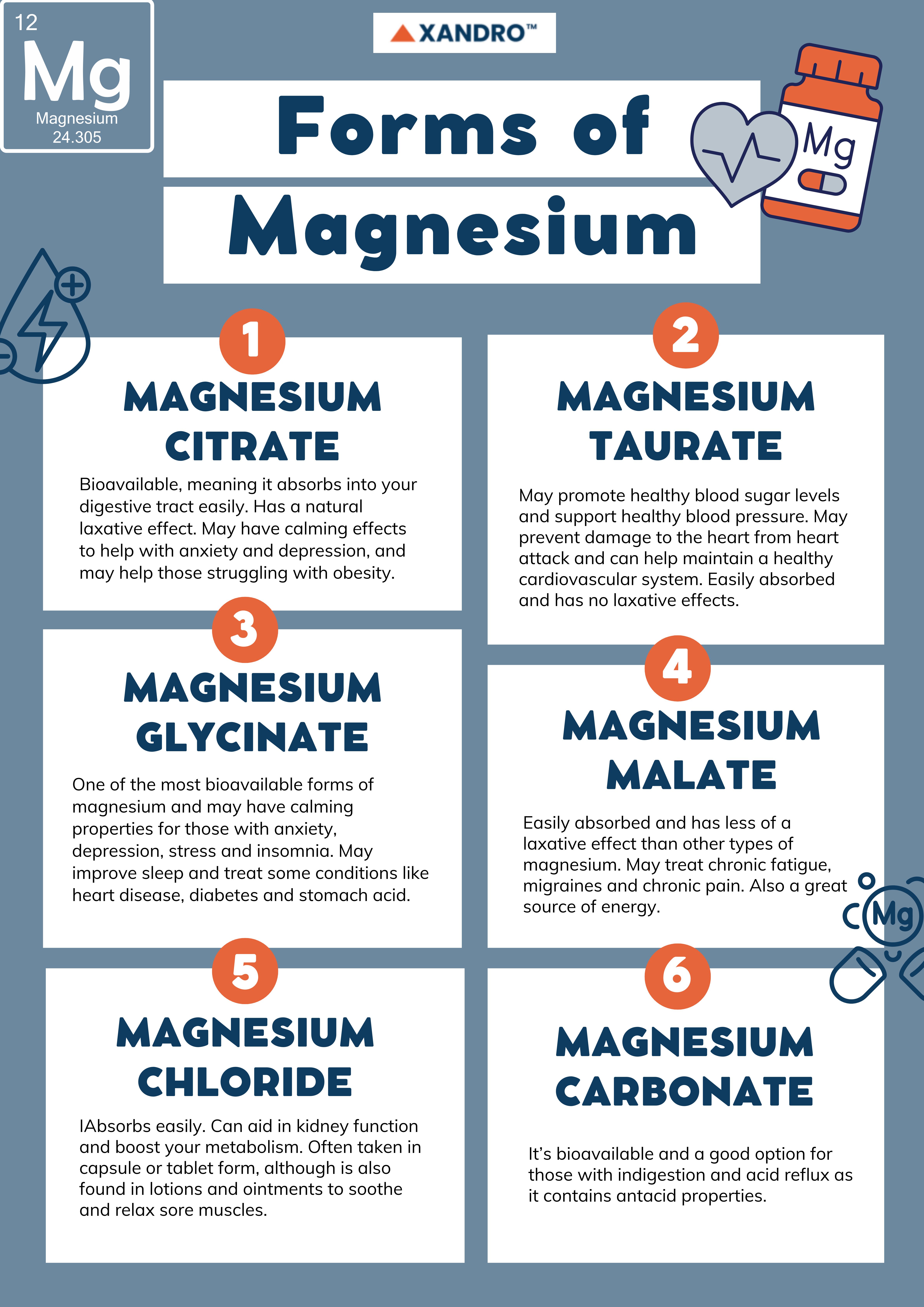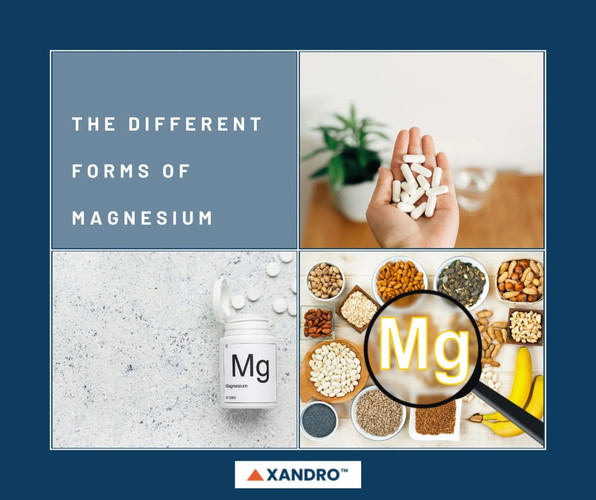Choosing the Right Magnesium Supplement: Benefits & Side Effects
18th Oct 2023
The different forms of magnesium and their benefits
Our bodies need magnesium for over 600 essential enzymatic reactions, such as energy production, regulating our blood pressure and muscle contraction. The body only absorbs around 30 to 40% of the dietary magnesium we consume, which makes it challenging to get enough from our diet.
A magnesium deficiency can cause or be a side effect of various health conditions, like type 2 diabetes, heart disease, osteoporosis and migraines. Magnesium benefits those who are deficient, so if this is you, when taking magnesium supplements, you may experience:
- Improved sleep
- Boosted mental health
- Easing of sore muscles and muscle cramps
- Aid in quitting smoking
- Boosted vitamin D absorption
- Supported health during pregnancy
- Enhanced bone health
Magnesium is naturally found in foods like green leafy vegetables, legumes, nuts and seeds, however, up to two-thirds of people in the West don’t get enough magnesium through their diet, which is where a magnesium supplement can be incredibly helpful.
So, you’ve decided to take a magnesium supplement, but now you’re left with the question, ‘Which form of magnesium should I take?'
Each type of magnesium has different properties, varying in their medical uses, bioavailability and potential side effects. Let’s go through some of these forms.

Magnesium Citrate
What it is: Bound with citric acid, this is one of the more common magnesium supplements. It’s taken orally and is relatively inexpensive.
Benefits: One of the most bioavailable forms of magnesium. This means it’s able to be absorbed into your digestive tract more easily than other magnesium forms. Magnesium citrate also has a natural laxative effect, so it’s often used in high doses to treat constipation. Some research suggests it may have some calming effects, so it’s one of the best forms of magnesium for anxiety and depression. May also help those struggling with obesity.
Side effects: It’s a great option for those with rectal or colon problems but not for those with loose bowel movements as it’s a laxative. Side effects can include loose stools, dizziness and increased sweating.
Magnesium Taurate
What it is: Contains the amino acid, taurine.
Benefits: This form of magnesium may promote healthy blood sugar levels and may support healthy blood pressure. This is the best magnesium supplement for heart health as it may help prevent damage, such as guarding the heart against damage caused by heart attacks, and help maintain a healthy cardiovascular system. It’s easily absorbed and contains no laxative properties.
Side effects: May experience adnominal cramping, dizziness, nausea, feeling warm or muscle weakness.
Magnesium Glycinate
What it is: Combines magnesium and the amino acid, glycine, which the body uses in protein construction.
Benefits: One of the best magnesium supplements for sleep. It may treat some inflammatory conditions like heart disease and diabetes, as well as too much stomach acid. This form of magnesium absorbs easily as its one of the most bioavailable and may have calming properties, helping those with anxiety, depression, stress and insomnia. A good option for people who need to increase their iron levels long-term without getting diarrhoea.
Side effects: May experience nausea and vomiting, while rare side effects can include kidney issues, nervousness and irritability.
Magnesium Malate
What It is: Includes malic acid which is naturally found in foods like fruit and wine. It has a sour taste, so is often added to foods to add flavour and acidity.
Benefits: Magnesium malate is easily absorbed in our digestive tract, so it’s great to take if your magnesium levels are low. Has less of a laxative effect than other types of magnesium. Some studies have suggested it can be used to treat fibromyalgia and chronic fatigue syndrome symptoms. May also help those who suffer from migraines or chronic pain. Magnesium malate is also a great energy source for people with fatigue or who want energy support in their pre-workout.
Side effects: May experience nausea, diarrhoea and stomach cramps. Can be toxic in very high doses.

Magnesium Chloride
What it is: A magnesium salt that includes chlorine.
Benefits: Is easily absorbable, meaning it’s used to treat low magnesium levels. Can aid in kidney function and boost your metabolism. Often taken in capsule or tablet form, although is also found in lotions and ointments to soothe and relax sore muscles.
Side effects: May experience an upset stomach, nausea, diarrhoea and vomiting, although rare side effects like thirst, hypotension, dizziness and muscle weakness can occur.
Magnesium Carbonate
What it is: This form of magnesium turns into magnesium chloride when mixed with the hydrochloric acid in our stomachs. Can be expensive.
Benefits: It’s bioavailable and a good option for those with indigestion and acid reflux as it contains antacid properties.
Side effects: Some people may experience allergic reactions, like skin rashes and hives.

Magnesium Oxide
What it is: A salt that combines magnesium and oxygen. Naturally a white, powdery substance that is often sold either as a powder or in capsule form. You might think magnesium oxide is good as it’s one of the most common forms of magnesium supplements, however, it doesn’t absorb that well into your body.
Benefits: Often used to relieve digestion issues, like heartburn, indigestion and constipation. Some research suggests it might help to treat and prevent migraines.
Side effects: May experience cramping or diarrhoea.
Magnesium Orotate
What it is: Combines orotic acid, a natural substance our body uses when creating genetic material, like DNA.
Benefits: Magnesium Orotate is easily absorbed into the body. May help our heart health due to its role in energy production in our heart and blood vessels. Due to this, it’s often used among athletes and fitness enthusiasts, as well as those with heart disease. Research has found magnesium orotate supplements can help symptoms of those with severe congestive heart failure. May also help our metabolism and help maintain our essential processes. The most expensive magnesium supplement.
Side effects: Doesn’t have strong laxative effects. May experience stomach upset and diarrhoea.
Magnesium Sulphate
What it is: Commonly known as Epsom salt, this form combines magnesium, sulphur and oxygen. It is white with a similar texture to table salt.
Benefits: It can be taken in capsule form or dissolved in water to treat constipation, although it has an unpleasant taste, and it can be dissolved in bathwater to soothe sore and achy muscles and may treat minor bruises and cuts.
Side effects: Orally, side effects can include stomach pain, bloating, nausea or a headache, while when soaking, these can include redness, irritation or infection. Can be dangerous when consuming large quantities, with overdosing easily occurring.
Magnesium Lactate
What it is: A salt formed with lactic acid, which is produced by our muscle and blood cells. Magnesium lactate is primarily manufactured as a preservative and flavouring agent.
Benefits: This form of magnesium is gentler on our digestive tract and it’s easily absorbed into our bodies. May also support heart and nervous system function.
Side effects: May experience diarrhoea, bloating, gas or an upset stomach.
Magnesium L-threonate
What it is: A salt combining magnesium and threonic acid, a water-soluble substance formed by the breakdown of vitamin C.
Benefits: This form of magnesium absorbs easily and may be the most effective for increasing magnesium levels in brain cells. For this reason, it’s often used for its potential brain benefits as a nootropic, and may help manage brain disorders like depression, Alzheimer’s disease and age-related memory loss.
Side effects: May experience an upset stomach and diarrhoea.
Magnesium Hydroxide
What it is: Comes orally, while also being added to some skincare products. It’s a medication known as a saline laxative.
Benefits: When added to skincare products, it may act as an anti-inflammatory and antimicrobial agent, while can relieve constipation and indigestion when taken orally on a short-term basis.
Side effects: A laxative, so can cause loose or more frequent stools. Not to be taken for longer than a week.
.jpeg?w=600&h=405)
How much magnesium per day
The average recommended daily magnesium dosage for women is 320mg and 420mg for men and magnesium supplements are generally safe for most people. During pregnancy, this may increase to about 400mg daily.
Certain forms or too much magnesium can cause mild side effects like diarrhoea and an upset stomach. Magnesium toxicity can occur in people with kidney disease or if you consume very large doses. Symptoms include nausea, vomiting, diarrhoea, muscle weakness, irregular breathing, lethargy and urinary retention. Magnesium can also interact with certain medications, like antibiotics.
You may start to feel the benefits of magnesium after about two weeks, but those severely deficient may feel the effect faster.
Always speak with a medical professional before taking any dietary supplements.
So, which form of magnesium should I use?
As shown, there are a range of different forms of magnesium, plus more we haven’t mentioned. When choosing which to use, consider how much you already consume through your diet and whether a supplement is necessary. Ask your doctor and get a range of blood tests, like a serum test and an RBC (red blood cells) magnesium test, to determine whether you’re deficient or not. From there, you can figure out how much additional magnesium you need.
In terms of which type of magnesium is best, you may simply need to try different types of magnesium to see what’s right for you.
Interested in where to start? Try out Xandro Lab’s Magnesium Glycinate 500mg today to see how you can experience the great benefits of magnesium!
